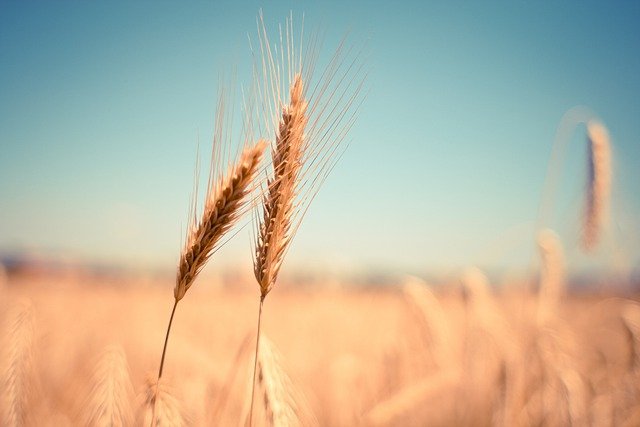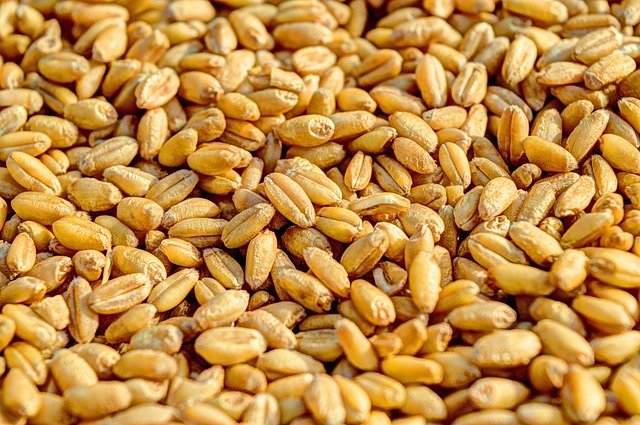The problem with wheat
Of late, wheat has been demonized and blamed for many diseases from autism to cancer to arthritis and even schizophrenia. Physicians have also written books like Wheat Belly and Grain Brain which further the narrative on the dangers and problems with wheat. Before deciding to jump on the gluten-free bandwagon, it is important to know the pros and cons of wheat (and gluten) consumption. The following will be a case for and against wheat from recent research.
History of Wheat
Wheat is a cereal grain that has been around for thousands of years. Proteins from wheat have been found in the teeth of ancient humans from 3.4 million years ago. Wheat is considered a staple grain worldwide. When eaten as a whole grain, wheat is an excellent source of nutrition. Wheat naturally self-pollinates and creates hybrids but often these hybrids don’t produce many seeds so farmers use commercial processes to create hybrids.

Wheat contains a protein called gluten. Gluten is what gives bread dough its elastic and stretchy properties. Gluten contains 2 smaller proteins, gliadin which is water-soluble, and glutenin which is water-insoluble.
What is the problem with wheat?
There are 2 medical conditions when gluten can make you extremely sick. These are celiac disease (which affects 1% of the population)and gluten sensitivity (which affects another 1%).

Many on the gluten-free or wheat-free camp strongly believe that wheat is allergenic and that it irritates the intestinal lining. The intestines are part of our bodies’ first lines of defense against toxins and infections. In a nutshell, the intestines form a nice barrier to keep the bad stuff from entering our bodies and letting the good stuff in. Recent research has shown that part of the gluten protein may disrupt this barrier. Subsequently, the protein can then enter the bloodstream. This triggers inflammation in the body and can cause symptoms including abdominal bloating, tiredness, joint pain, and even a lack of mental clarity.
If you search the internet you will find many people reporting to feel much better when they stop eating wheat or go gluten-free. However, it is very important to note that anecdotes are just stories and they can’t be used to prove or disprove a hypothesis either for or against wheat.
Another concern from the gluten-free camp is that gluten can be degraded into several morphine-like compounds which may be addictive.
From what you just read, wheat sounds really bad. Why don’t we all just stop eating wheat? Well, for the other 98% of the population that do not have celiac disease or gluten sensitivity wheat can actually be good for you.

The Case for Wheat
While some studies have shown that wheat disrupts the intestinal barrier. Other studies have shown that it actually benefits your intestinal lining by increasing the number of beneficial bacteria in the intestines. Wheat also increases the number of natural killer cells in the body which are an important part of the immune system. These cells kill early cancer cells and viruses.
Similar to the hygiene hypothesis and the environment, there is a concern we might be doing the same thing to our intestines. What this means is that by avoiding certain foods like wheat, we might be making our intestines too sterile. Consequently, we may not be able to tolerate new and different foods. Foods may also end up being difficult to digest.
Many on this side of the argument believe that gluten intolerance (without celiac disease) could be a sign of a weakened digestion. You can stop eating gluten, but a strong digestion is important for many other foods and perhaps most importantly to detoxify the body from environmental pollutants that we just cannot avoid. Even the best organic veggies are laced with mercury from the coal mine plumes that cover most of America and many other parts of the world. If you cannot digest gluten, then your natural detox pathways are likely compromised which puts you at greater risk from other toxins.
Also, while wheat has opioid-like properties many other foods such as soy, spinach, rice, meat, fish, dairy, fruit, coffee, and chocolate have similar properties.
It is important to know that the gluten-free industry is a $16 billion dollars a year industry. There’s a lot of money to be made and gluten-free products are now big business. This industry may be making the issue to be bigger than it is. Also, processed gluten-free foods are just as unhealthy as gluten-containing processed foods.
While these 2 sides seem to have extremely opposing views they do have plenty of agreement. Here are a few key points they agree upon.
– Stop eating processed foods and avoid pesticides in our diet
– Eat real food (things that are not packaged)
– Avoid refined carbohydrates (white bread, croissants)
– Eat more vegetables
Just by following these suggestions, most people will make a positive impact on their health.
Where do we go from here?
There still needs to be more research on this topic. There have been just as many articles that show the hazards as well as the benefits of wheat. Perhaps, there is something else that is causing these real symptoms for many that are gluten intolerant. From an anthropologic perspective, there is data to suggest that our ancient ancestors were eating gluten-containing foods. Is there something different with our wheat and environment now? There are still many questions to be answered.
There is plenty of delicious gluten contain foods and it is important to fully understand what is occurring before we can make a strong case for or against wheat.
References:
Am J Clin Nutr. 2015 Feb;101(2):251-61. doi: 10.3945/ajcn.114.088120. Epub 2014 Dec 3. Whole-grain wheat consumption reduces inflammation in a randomized controlled trial on overweight and obese subjects with unhealthy dietary and lifestyle behaviors: role of polyphenols bound to cereal dietary fiber.Vitaglione P, Mennella I, Ferracane R, Rivellese AA, Giacco R, Ercolini D, Gibbons SM, La Storia A, Gilbert JA, Jonnalagadda S, Thielecke F, Gallo MA, Scalfi L, Fogliano V.
J Nutr. 2015 Feb;145(2):215-21. doi: 10.3945/jn.114.202176. Epub 2014 Dec 3. Increased whole grain consumption does not affect blood biochemistry, body composition, or gut microbiology in healthy, low-habitual whole grain consumers. Ampatzoglou A, Atwal KK, Maidens CM, Williams CL, Ross AB, Thielecke F, Jonnalagadda SS, Kennedy OB, Yaqoob P.
Eur J Nutr. 2016 Feb;55(1):183-95. doi: 10.1007/s00394-015-0836-y. Epub 2015 Jan 25. Effects of increased wholegrain consumption on immune and inflammatory markers in healthy low habitual wholegrain consumers. Ampatzoglou A, Williams CL, Atwal KK, Maidens CM, Ross AB, Thielecke F, Jonnalagadda SS, Kennedy OB, Yaqoob P.
Eur J Immunol. 2014 Oct;44(10):3056-67. doi: 10.1002/eji.201344264. Epub 2014 Sep 18. Dietary gluten increases natural killer cell cytotoxicity and cytokine secretion. Larsen J, Dall M, Antvorskov JC, Weile C, Engkilde K, Josefsen K, Buschard K.
Clin Transl Gastroenterol. 2018 Sep 19;9(9):181. doi: 10.1038/s41424-018-0052-1. Combination of Gluten-Digesting Enzymes Improved Symptoms of Non-Celiac GlutenSensitivity: A Randomized Single-blind, Placebo-controlled Crossover Study.Ido H, Matsubara H, Kuroda M, Takahashi A, Kojima Y, Koikeda S, Sasaki M.
Curr Opin Pediatr. 2016 Oct;28(5):638-43. doi: 10.1097/MOP.0000000000000392. Nonceliac gluten sensitivity: an approach to diagnosis and management.Collyer EM, Kaplan BS.
World J Gastroenterol. 2017 Oct 28;23(40):7201-7210. doi: 10.3748/wjg.v23.i40.7201. Non-celiac gluten sensitivity: All wheat attack is not celiac.Igbinedion SO, Ansari J, Vasikaran A, Gavins FN, Jordan P, Boktor M, Alexander JS.

